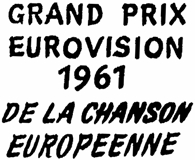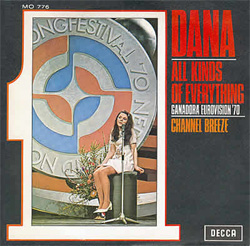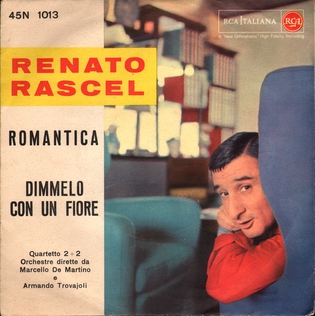
The Eurovision Song Contest 1960 was the fifth edition of the annual Eurovision Song Contest, held on Tuesday 29 March 1960 at the Royal Festival Hall in London, United Kingdom, and hosted by British television presenter and actress Catherine Boyle. Organised by the European Broadcasting Union (EBU) and host broadcaster the British Broadcasting Corporation (BBC), the United Kingdom was offered the rights to stage the contest after the Netherlands, which had won the 1959 contest, declined the opportunity after having organised the event in 1958.

The Eurovision Song Contest 1961 was the 6th edition of the annual Eurovision Song Contest. Once again, the contest was held in the French seaside city of Cannes, having also hosted the 1959 edition. Organised by the European Broadcasting Union (EBU) and host broadcaster Radiodiffusion-Télévision Française (RTF), the contest was again held at the Palais des Festivals et des Congrès on Saturday 18 March 1961, becoming the first contest to take place on a Saturday evening, a tradition that has continued ever since. The show was directed by Marcel Cravenne and again hosted by Jacqueline Joubert, who had also hosted in 1959.

The Netherlands has participated in the Eurovision Song Contest 64 times since making its debut as one of the seven countries at the first contest in 1956. The country has missed only four contests, twice because the dates coincided with Remembrance of the Dead, and twice because of being relegated due to poor results the previous year. It has missed the final despite qualifying once, in 2024, due to the personal conduct of its entrant which led to disqualification. The Netherlands has hosted the contest five times: in Hilversum (1958), Amsterdam (1970), The Hague, and Rotterdam (2021).

France has participated in the Eurovision Song Contest 68 times since its debut at the first contest in 1956. France is one of only seven countries to be present at the first contest, and has been absent from only two contests in its history, missing the 1974 and 1982 contests. Along with Germany, Italy, Spain, and the United Kingdom, France is one of the "Big Five" countries that are automatically prequalified for the final, due to being the largest financial contributors to the European Broadcasting Union (EBU). France has won the contest five times.

Gigliola Cinquetti is an Italian singer, songwriter and television presenter.

"All Kinds of Everything" is a song recorded by Irish singer Dana written by Derry Lindsay and Jackie Smith. It represented Ireland in the Eurovision Song Contest 1970 held in Amsterdam, resulting in the country's first ever win at the contest. The recording became an international hit.

"Ein bißchen Frieden" is a song recorded by German singer Nicole, with music composed by Ralph Siegel and German lyrics written by Bernd Meinunger. It represented Germany in the Eurovision Song Contest 1982, held in Harrogate, resulting in the country's first ever win at the contest.

"'n Beetje", spelled in full as "Een beetje", is a song recorded by Dutch singer Teddy Scholten with music composed by Dick Schallies and Dutch lyrics written by Willy van Hemert. It represented the Netherlands in the Eurovision Song Contest 1959 held in Cannes, winning the contest. It was the second victory for the country in the first four years of the contest.

"Tom Pillibi" is a song recorded by French singer Jacqueline Boyer with music composed by André Popp and French lyrics written by Pierre Cour. It was released as a single on 10 April 1960. It represented France in the Eurovision Song Contest 1960 held in London, winning the contest. It was covered by several artist including Julie Andrews.

"La, la, la" is a 1968 song recorded by Spanish singer Massiel, written by Manuel de la Calva and Ramón Arcusa –the members of Dúo Dinámico–. It represented Spain in the Eurovision Song Contest 1968 held in London, being the first song from Spain to ever win the contest.

"L'Oiseau et l'Enfant" is a song recording by French singer Marie Myriam with music composed by Jean-Paul Cara and French lyrics written by Joe Gracy. It represented France in the Eurovision Song Contest 1977 held in London, resulting in the country's last win to date at the contest.

"Romantica" is a song written by Italian singer-songwriter Renato Rascel with Dino Verde. It was performed for the first time during the tenth Sanremo Music Festival in January 1960, when two different versions of the song were sung by Rascel and Tony Dallara. Rascel performed the song as a soft ballad, while Dallara, who was considered by Italian music critics as one of the urlatori ("screamers"), a music style popular in Italy during the 1960s, gave a more powerful rendition of the song.
Events from the year 1960 in France.
André Charles Jean Popp was a French composer, arranger and screenwriter.
France participated in the Eurovision Song Contest 2003 with the song "Monts et merveilles" written by Hocine Hallaf. The song was performed by Louisa Baïleche. The French broadcaster France Télévisions in collaboration with the television channel France 3 internally selected the French entry for the 2003 contest in Riga, Latvia. "Monts et merveilles" was officially presented to the public by France 3 as the French entry on 7 March 2003 during the France 3 programme Le Fabuleux Destin de....

Songs of Europe is a concert television programme commemorating the Eurovision Song Contest's twenty-fifth anniversary. The event was held in Mysen, Norway in 1981, featuring all but eight of the winners of the Eurovision Song Contest from its first edition in 1956 to 1981, and broadcast to more than 100 million viewers all over Europe.
This is a list of French television related events from 1960.
France originally planned to participate in the Eurovision Song Contest 2020 with the song "Mon alliée " written by Tom Leeb, Léa Ivanne, Amir Haddad, John Lundvik, Peter Boström and Thomas G:son. The song was performed by Tom Leeb. The French broadcaster France Télévisions in collaboration with the television channel France 2 internally selected the French entry for the 2020 contest in Rotterdam, Netherlands. Tom Leeb was officially announced by France 2 as the French entrant on 14 January 2020 and later the song was presented to the public as the contest entry during a live performance by Leeb on 16 February 2020 during the France 2 programme 20H30 Le Dimanche.
France participated in the Eurovision Song Contest 2021 with the song "Voilà" written by Barbara Pravi, Lili Poe and Igit. The song was performed by Barbara Pravi. The French broadcaster France Télévisions in collaboration with the television channel France 2 organised the national final Eurovision France, c'est vous qui décidez ! in order to select the French entry for the 2021 contest in Rotterdam, Netherlands. Twelve songs competed in the national final where the winner was selected over two rounds of voting. In the first round, eight entries were selected to advance to the second round: seven entries selected a public vote and one entry selected by a ten-member jury panel. In the second round, "Voilà" performed by Barbara Pravi was selected as the winner following the combination of votes from a ten-member jury panel and a public vote.
France participated in the Eurovision Song Contest 2022 in Turin, Italy, with "Fulenn" performed by Alvan and Ahez. The French broadcaster France Télévisions organised the national final Eurovision France, c'est vous qui décidez ! in order to select the French entry for the 2022 contest. Twelve songs competed in the national final on 5 March 2022, where the winner was selected over two rounds of voting.












